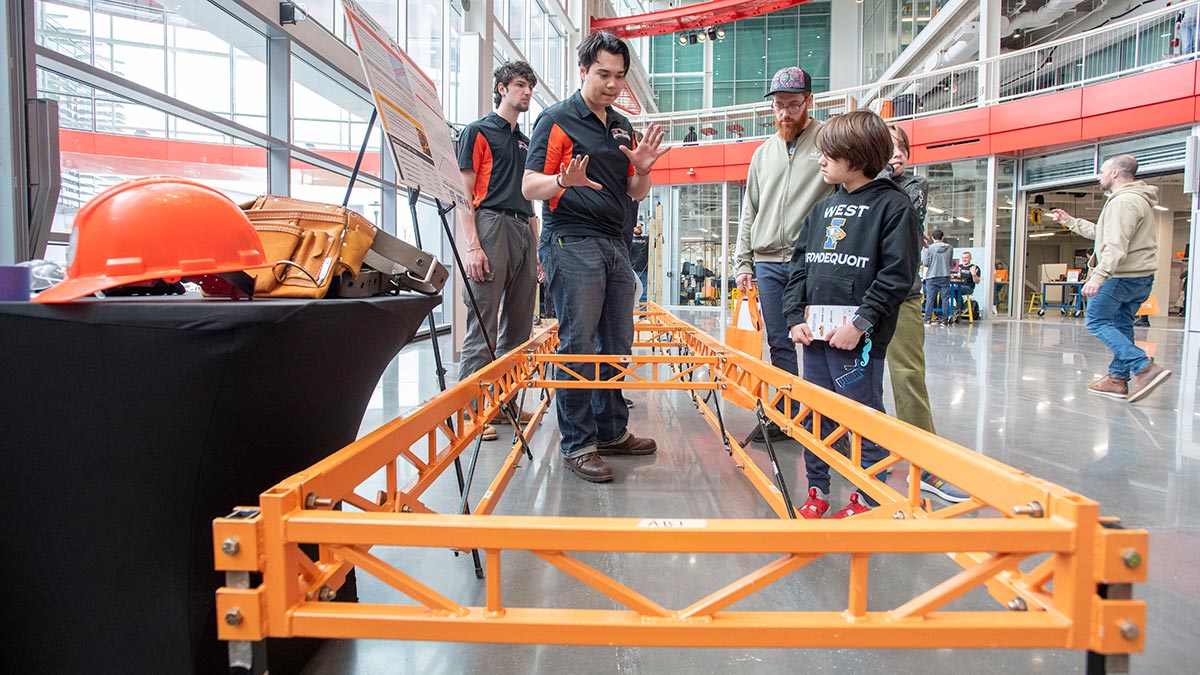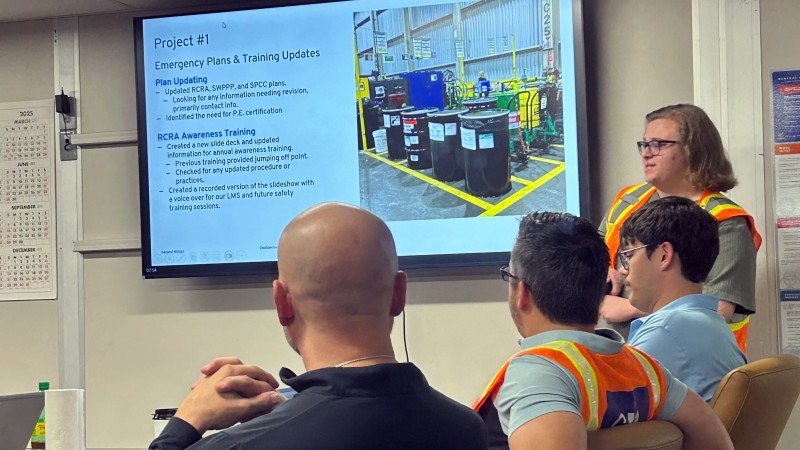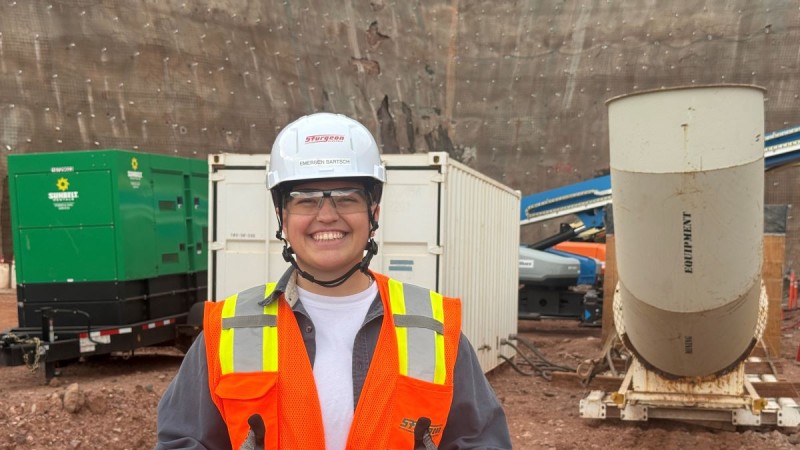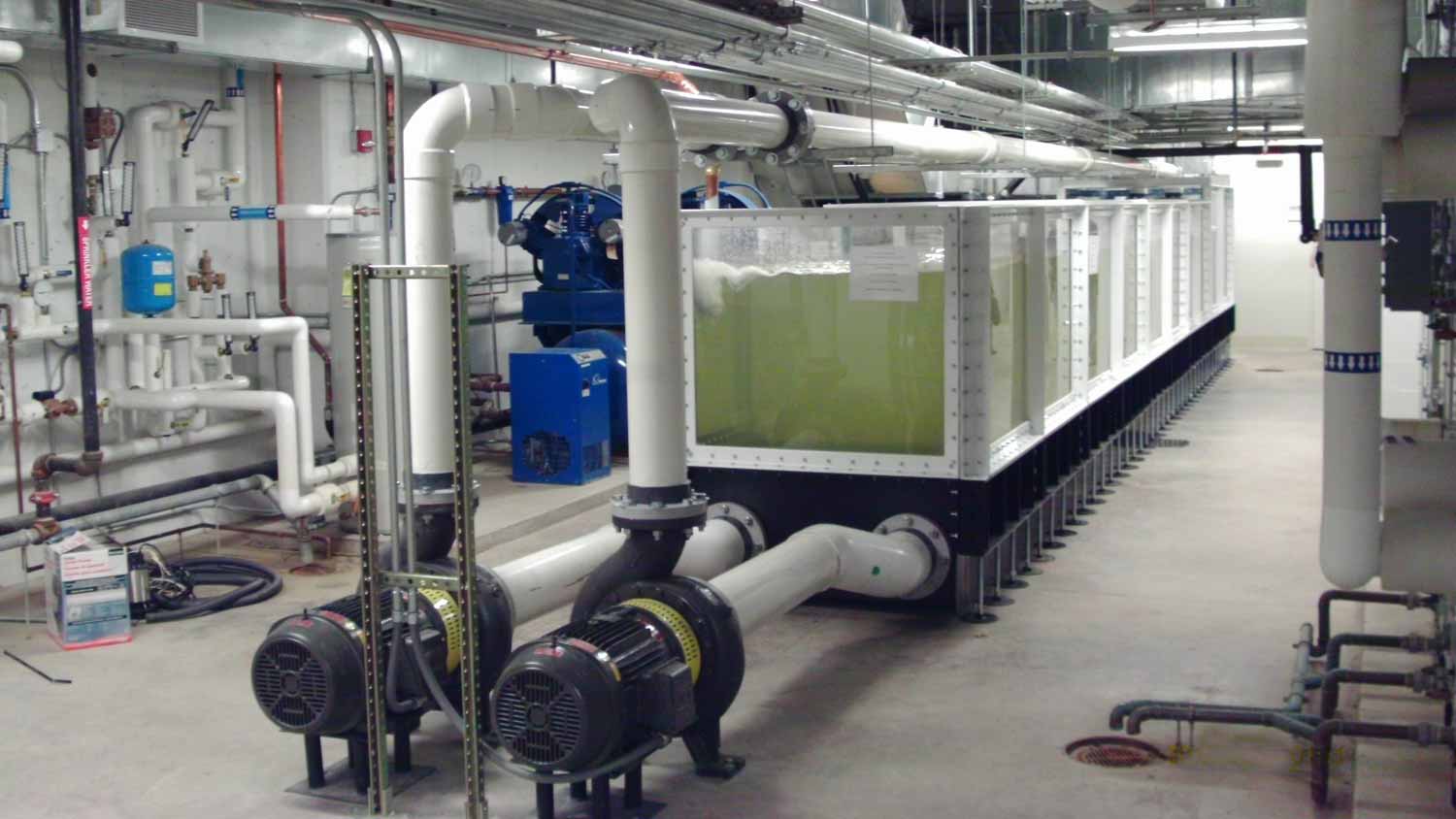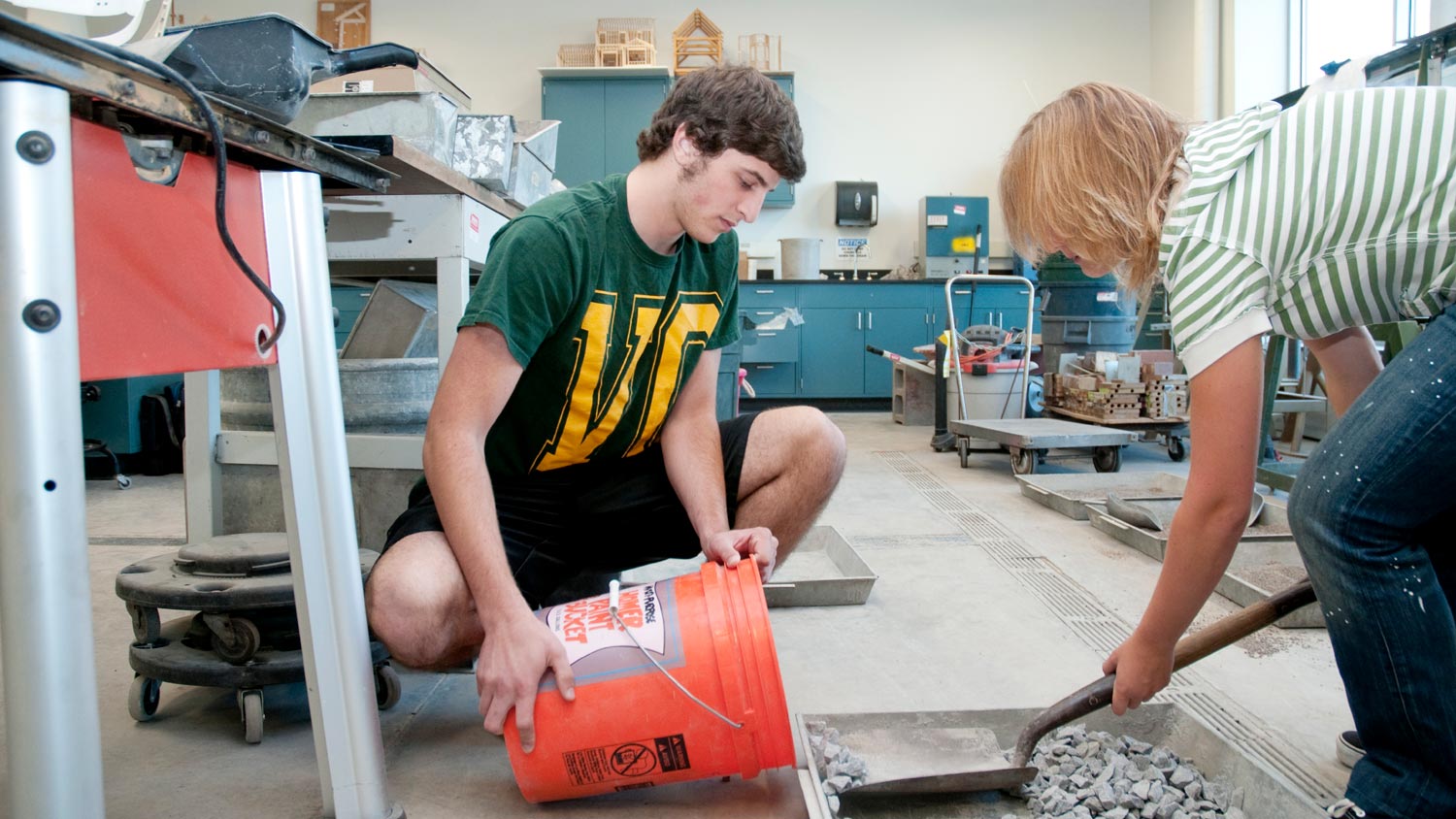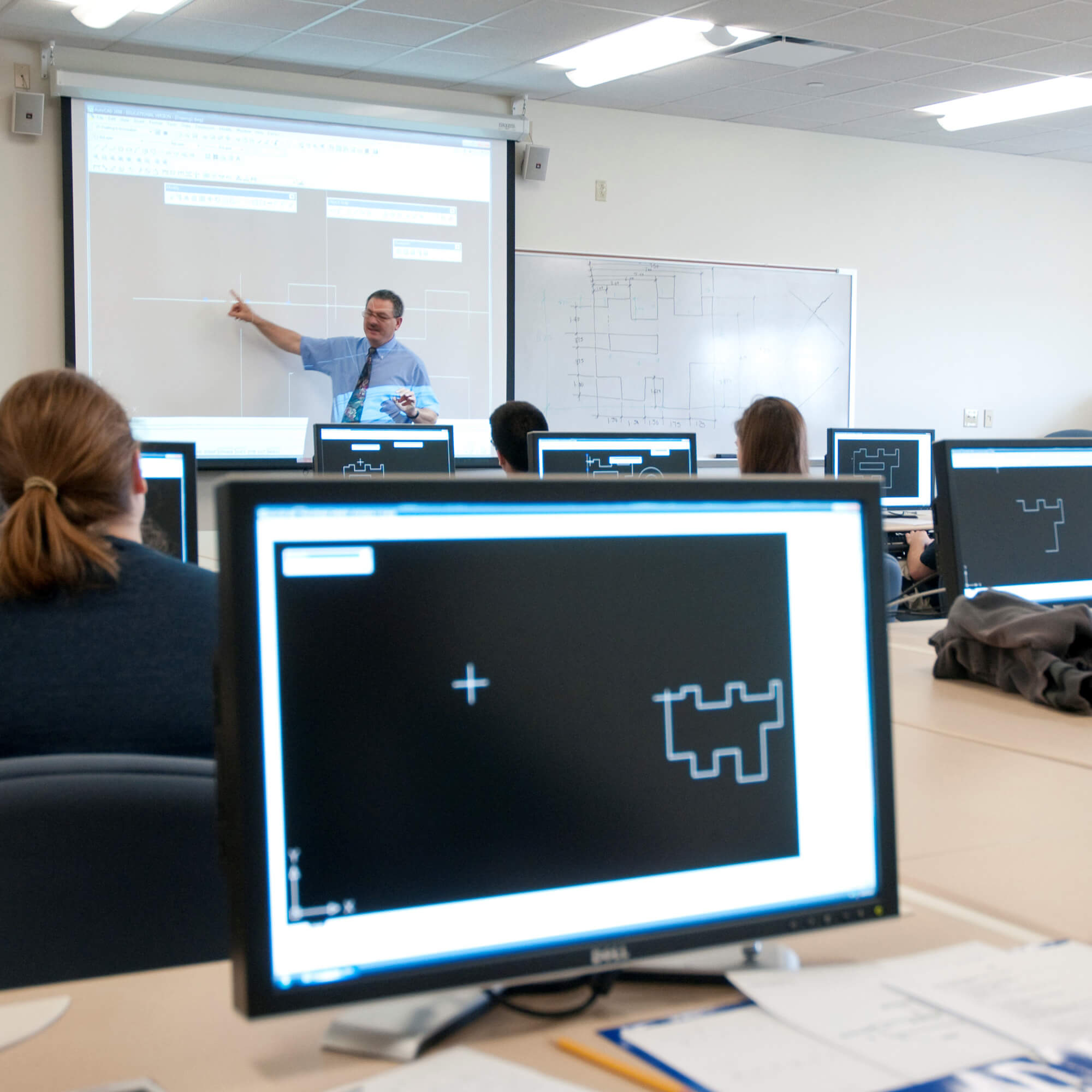Department of Civil Engineering Technology, Environmental Management and Safety
- RIT/
- College of Engineering Technology/
- Academics/
- Departments/
- Department of Civil Engineering Technology, Environmental Management and Safety
Overview
The programs offered by RIT’s Department of Civil Engineering Technology, Environmental Management and Safety (CETEMS) represent the professions central to the design, construction, operation, and maintenance of the built environment. If your passion lies in designing new bridges, buildings, or the vast array of public works; helping manage construction projects; helping organizations move toward a safer, environmentally responsible, and more sustainable future; or the development, operation, and maintenance of buildings, you’re in the right place.
With an emphasis on practical, applied, and stimulating experiential learning, our programs’ coursework, coupled with co-operative work experiences, can help position you to make tangible contributions, right away, in your chosen profession. Students have the opportunity to participate with faculty and other students outside the classroom in student clubs (ASCE, AGC, ASSE, SEAL) and student competition teams (Concrete Canoe, Steel Bridge, ASC CM). These club activities and competitions give students an opportunity to apply classroom knowledge to solve real-world problems in design, construction, and environmental sustainability.
Vision
Our vision is to be a recognized national leader in the preparation of skilled professionals in: civil engineering technology; environmental sustainability, health and safety management and construction management. We envision our graduates as prepared and committed to moving us toward a more sustainable and socially responsible future.
Mission
The CETEMS mission is to achieve its vision by creating and maintaining an optimal teaching and learning environment in which staff and faculty grow professionally and students receive unsurpassed knowledge, skills, insights and the tools for lifelong learning in their respective disciplines.
Adapting and combining the musings on education of several great philosophers, CETEMS views education as the key to creating and sustaining civilization (Plato); recognizes that human nature, routines of behavior, and social reality are important influences in the process of education (Aristotle); and seeks to cultivate curiosity in students as a primary behavioral manifestation of human education (Rousseau).
Values
We recognize and value that:
- Our academic programs are all about designing, building and maintaining the infrastructure of civilization;
- Human beings and the places that we live, work and play are indeed part of the environment; and
- Having a safe and healthy environment is requisite to a prosperous civilization.
Strategies
- Work effectively with industry to provide cooperative education experience and applied research opportunities for our students.
- Deliver academic programs in multiple formats to meet the needs of full-time and part-time students and the needs of distant as well as local students.
- Provide state-of-the-art facilities that encourage learning, student project work and applied research.
- Incorporate continuous improvement into the work plans of faculty and staff, as well as into maintain and upgrading curriculum and facilities.
Accreditation
Visit the college's accreditation page for information on enrollment and graduation data, program educational objectives, and student outcomes.
6
Clubs/teams in which students can participate with their discipline outside of the classroom
11%
The civil and construction fields will grow 11% faster than average between 2016 and 2026, according to U.S. Bureau of Labor Statistics
1 Year
Time each undergraduate student spends on co-op, experiencing their career field and developing skills that cannot be mastered in the classroom
Latest News
-
November 18, 2025

Civil engineering technology alumni return to grow RIT campus
Two civil engineering technology graduates from 2008 have returned to the RIT campus, this time, to use their knowledge to help build the Music Performance Theater set to open next spring.
-
October 27, 2025

Study Cautions That Heavier Electric Trucks May Overload New York City’s Infrastructure
Bioengineer cites a study about the effects of increased electric truck weights on the road co-authored by Zilin Bian, assistant professor in the Department of Civil Engineering Technology, Environmental Management and Safety.
-
June 30, 2025

RIT concrete canoe a surprise success story on way to this weekend’s ASCE Student Championships
ASCE speaks to concrete canoe team club captain Leah Mestayer, a third-year civil engineering technology student, and Lois Furioso, team adviser and adjunct faculty member, about earning RIT's highest placement at the Upstate New York-Canada Student Conference in nearly two decades.
Featured Work and Profiles
-
Protecting People and Planet: ESHS Student Drives Real-World Change at General Motors (GM) on Environmental Engineering Co-op
Matthew Huth Motivated by living through environmental tragedies like Hurricane Katrina, Matthew translated RIT's practical skills into a high-impact co-op, implementing a lasting recycling program at General...
Read More about Protecting People and Planet: ESHS Student Drives Real-World Change at General Motors (GM) on Environmental Engineering Co-op -
Full-Time Before Graduation: How RIT’s ESHS BS/MS Launched a Safety Specialist Career
Emersen Bartsch Learn how graduating student Emersen secured a full-time Safety Specialist role with a major electrical contractor in Colorado before completing their degree.
Read More about Full-Time Before Graduation: How RIT’s ESHS BS/MS Launched a Safety Specialist Career -
ESHS Student finds surprising fit with Electric Vehicle Team
Janet, a third-year environmental sustainability, health and safety and economics major from Rockville, MD., is the team manager of the RIT Electric Vehicle Team, a collegiate electric motorcycle...
Read More about ESHS Student finds surprising fit with Electric Vehicle Team -
Researchers discover solutions to build stronger bridges
Civil ET students, Albert Petry and James Warren, worked with Amanda Bao, professor of civil engineering technology, to validate structural design options for bridges that can improve longevity,...
Read More about Researchers discover solutions to build stronger bridges -
First-Gen to Fortune 100: Alum's Journey to Tesla and New Balance
Discover how first-gen student Leah's journey from a dairy farm to roles as Regional Safety Manager for Tesla’s Energy division and EHS Engineer for New Balance was made possible by her passion, RIT's...
Read More about First-Gen to Fortune 100: Alum's Journey to Tesla and New Balance -
Civil engineers seek ways to prevent future bridge disasters
Amanda Bao Spectrum News speaks to Amanda Bao, Interim Department Chair of the Department of Civil Engineering Technology, Environmental Management and Safety, about how the tragedy in Baltimore could have been...
Read More about Civil engineers seek ways to prevent future bridge disasters
Undergraduate Programs
RIT’s Bachelor of Science degree in civil engineering technology prepares students to enter careers in construction management, civil design, structural design, or environmental controls. The curriculum uses a combination of challenging academics, hands-on laboratory experiences, and practical cooperative work education to cultivate students who are grounded in applications-oriented approaches to solving the world's problems.
RIT’s environmental sustainability, health and safety BS degree prepares its graduates to work as environmental sustainability, health and safety (EHS) project and program specialists and managers for organizations in industry and government. Graduates of our program help industries produce goods and services without contaminating the environment, without subjecting the workers to hazardous conditions and chemicals, and using less energy and fewer precious resources.
Analyze and solve real-world infrastructure challenges in RIT’s civil engineering technology degree.
Learn more about the Civil Engineering Technology BS programDrive real-world change: transform food systems, advance sustainable production, and mitigate pollution through RIT’s sustainability option in ESHS BS.
Learn more about the Environmental Sustainability Option - Environmental Sustainability, Health and Safety BS programLead sustainability initiatives and promote safer, healthier, and more resilient workplaces and communities with RIT’s ESHS degree.
Learn more about the Environmental Sustainability, Health and Safety BS programRIT’s Health and Safety Option – ESHS BS prepares you to be on the frontlines of keeping people safe each day and in intense environments.
Learn more about the Health and Safety Option - Environmental Sustainability, Health and Safety BS programPrepare for careers in hazard assessment and emergency planning with the surveying and geospatial analysis option - ESHS BS at RIT.
Learn more about the Surveying and Geospatial Analysis Option - Environmental Sustainability, Health and Safety BS programGraduate Programs
The online Master of Science degree in environmental, health and safety management provides a solid foundation in the managerial aspects needed to develop and implement environmental, health and safety management systems that can move organizations toward a more sustainable and socially responsible future. Program graduates have a solid technical foundation in air emissions, wastewater, solid and hazardous waste, occupational safety and occupational health (industrial hygiene). Elements of sustainability are integrated into most of the core courses and some electives.
The online MS degree program in construction management is designed to develop competencies in leadership, construction cost analysis and control, construction operations management, and construction business development. The goals of the program are to provide graduates with the requisite strategic skills to lead and advance the construction industry. To accommodate the working professional, the program is available entirely online.
Lead sustainability and safety efforts with RIT’s MS in environmental health and safety management.
Learn more about the Environmental, Health and Safety Management MS programDesigned for students who want to become experts and thought leaders in the civil and construction industries, and contribute to the development of smart cities and urban infrastructure.
Learn more about the Smart Cities Construction Management MS programMinors and Immersions
The construction management minor broadens the learning experiences and professional opportunities of students who have an interest in building construction, bid development, management of construction projects after a successful bid, and the business, management, and technical aspects related to construction.
Learn more about the Construction Management Minor programThe structural design minor creates a focus on the different types of structures and materials used in design. It also introduces related design codes. The minor is designed to accommodate students majoring in mechanical engineering technology or mechanical engineering.
Learn more about the Structural Design Minor programThe water resources minor broadens the learning experiences and professional opportunities of students in technical disciplines who have an interest in courses related to water treatment, wastewater treatment, hydrology, the environment and society.
Learn more about the Water Resources Minor programAdvisory Board
The CETEMS Department Advisory Boards are comprised of successful engineers, managers, and leaders who work at various businesses throughout the world. Together they review each programs curriculum to ensure that our programs remain up-to-date and respond to industry changes. The committee have annual meetings at the end of the academic year. Learn more about the professionals that comprise our advisory committees.
Student Clubs and Organizations
American Society of Civil Engineers student chapter
ASCE focuses on preparing upcoming civil engineers for a successful career in engineering and construction through workshops, presentations, and hands on involvement in our two competitive teams. These two teams are where students have the opportunity to meet new peers, learn about managing a successful project, and learn hands on skills that aren't taught in a classroom. The Concrete Canoe team designs, constructs and races a canoe made of concrete each year, proving that concrete is a versatile building material. Annually, the AISC Steel Bridge team designs and builds a modular bridge made of steel components, which is challenged with heavy loads.
Associated General Contractors
The AGC furthers the career opportunities of its members in the construction industry by interacting and communicating with the business world, developing leadership and organizational skills and informing students on the political agendas regarding the future of the construction industry. Teams of students compete annually in four categories in a Construction Management competition.
Student Environmental Action League (SEAL)
The Student Environmental Action League (SEAL) units students with a common interest in the environment, allowing them to make a positive impact on the RIT and Rochester communities. As an SG recognized club, SEAL has access to resources that allows them to sponsor campus-wide events to promote recycling and spread knowledge about our environment to the student population. Annual events include an Electronic Waste Collection, Environmental-themed Game Show, and Project Runway Goes Green Extravaganza. The club's like-minded members also partake in social activities throughout the semester which encourage outdoor activities and conscious use or resources. Learn More
Student Resources
The CETEMS Department offers a variety of resources for our students such as:
- Academic Advisors
- Student Clubs and Organizations
- Technical Information and Support
- Software Help
- CET Student Scholarships and Awards
Visit our Student Resources page for more information.



